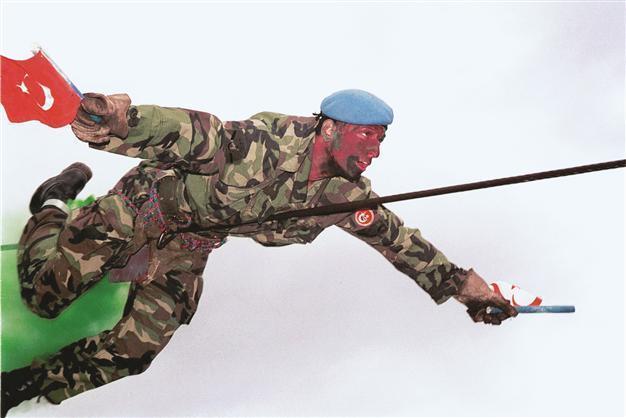No sympathy for Turkish army in Cyprus: Report
ISTANBUL - Hürriyet Daily News

A Turkish Cypriot commando whose face is covered with camouflage paint, holds Turkish and Turkish Cypriot flags as he performs manuvers over a rope at St. Hilarion Castle between Nicosia and Kyrenia in north Cyprus November 22, 2000. REUTERS photo
Both Turkish and Greek Cypriots think the existence of the Turkish army on the island should be reviewed and the Turkish government should decrease the number of Turkish soldiers there, according to a report revealed by the Turkish Economic and Social Studies Foundation, or TESEV.
“The oversight the Turkish military currently has over the Turkish Cypriot police was highlighted by people on both sides as something that could be reformed. In addition, some version of a reduction in Turkish troop numbers was also brought up,” one of the researchers, Associate Professor Rebecca Bryant from Middle East Technical University (ODTÜ) said at a conference held by TESEV in Istanbul.
In 1974, the Turkish army intervened in the northern part of the island after the government in Athens had been overthrown in a coup. The Turkish Republic of Northern
Cyprus is only recognized by
Turkey. Ankara has about 40,000 troops stationed in the territory.
Bryant and Dr. Christalla Yakinthou, from the International Center for Transitional Justice, have conducted research among 50 people including opinion leaders, businessmen, NGO representatives and academics in Cyprus, on the perception of Turkey on the island. “The way that Turkish government representatives speak to and about people offends both Turkish Cypriots and Greek Cypriots. Perhaps a revision of public diplomacy across the board would be a useful show of goodwill,” Bryant said. “Interviewees from both communities suggested different versions of the basic formula of land for Greek Cypriots in exchange for access to international ports, either air or sea, by Turkish Cypriots,” Bryant said. Bryant said both communities also mentioned increasing direct dialogue between representatives of two communities as an important recommendation to improve relations between themselves and Turkey.
Trust neededAccording to the report, both Greek and Turkish Cypriots feel uncertain about the future of the negotiations between the two sides. According to Turkish Cypriots, the relationship between Turkey and Northern Cyprus is most commonly described as an “unequal relationship that is not based on respect,” Bryant added. “Turkish Cypriots want ‘respect’ based on political equality, they want to be consulted regarding the policies of Turkey in Northern Cyprus, they want the migration from Turkey to be taken under control,” she said.
Yakinthou said one of the most important issues between Greek Cypriots and Turkey was the issue of “trust.” “Greek Cypriots have historical fears of Turkey, therefore it is important to create a long-term strategy to build trust. If you want to unlock the situation with the Greek Cypriots, you have to address the issue of trust first,” she said. Some possible confidence-building measures include “restoring Greek Cypriot cultural heritage sites, creating and sharing a strategy to reduce the presence of the Turkish military stationed in Cyprus, opening Varosha under EU or U.N. control, and requesting the opening of Famagusta port under EU control,” according to the report.
